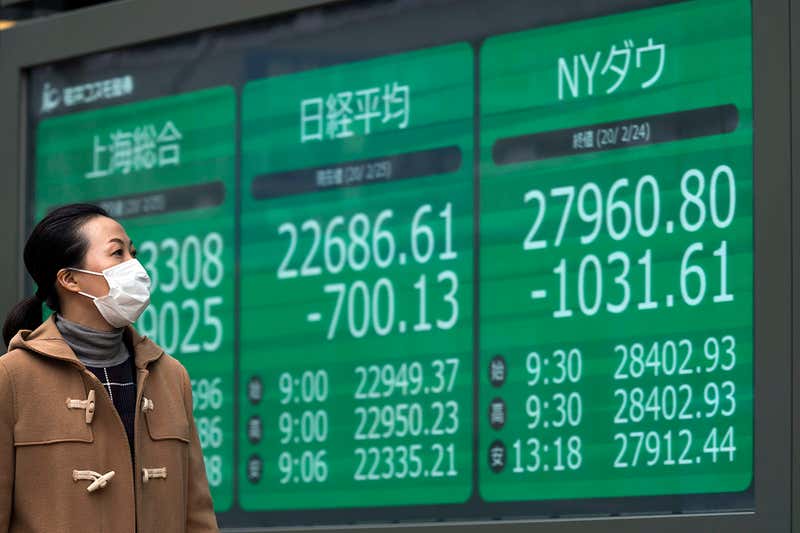The COVID-19 outbreak has left economies crippled on a national level. As the world strives to fight this invisible enemy, the death toll continues to rise. Though some areas in the world are finding a flattening in their curve of cases, economies have already leveled out. According to a report by Oxford Economics, if the pandemic lasts six months, it could knock off as much as $1 trillion from the Global GDP, causing a contraction of 2.2%.
In the United States, unemployment is at an all time high. In fact, “6.6 million Americans filed for unemployment last week and another 6.9 million the week before that. That was a massive surge: The previous record high was 695,000, set in 1982,” according to the Department of Labor
Across the nation, businesses from restaurants to barber shops to gyms have closed, leaving millions unemployed. With all of these businesses closing, investors continue to lose faith in the market, with some selling their stocks. Both courses of action led to the current essentially closed off economy, with experts believing a recession is inevitable.
With the passing of the Senate’s Stimulus Package, citizens desperately await for their check from the government. For the majority of Americans, this is to no avail.
According to The Motley Fool, “Up to 65 Million People Won’t Receive a Trump Stimulus Check.”
This 65 million is approximately 19.8% of the total population of the United States, 327 million as of 2018, not receiving a stimulus check. This is due to the fact that dependents over the age of 17, high-income earners and those without social securities have been deemed ineligible.
While the United States grapples with unemployment, a lack of necessary resources in stores and nationwide protests, the rest of the world is also not faring well. On a global scale, “The International Monetary Fund sees the world economy suffering its worst recession since the Great Depression this year, with emerging markets and low-income nations in Africa, Latin America and Asia at particularly high risk,” Bloomberg reports.
The South Asian region, comprising eight countries including India, Pakistan and Bangladesh, is likely to experience a slow-down in economic growth, expected to grow between 1.8% and 2.8% this year, compared to the 6.3% projected six months ago by World Bank. In Bangladesh, the Prime Minister initially announced an emergency stimulus package of $600 million on March 25. This was expanded to $8.5 billion on April 4. Furthermore, the most important markets for Bangladesh’s biggest export item, readymade garments, such as the US, UK, Germany and Italy are likely to be hit hard due to the lockdown.
In Africa, the economy is already weakened by massive debt and a continuous drop in oil prices. Therefore though the continent has significantly less cases than the United States, it will still be devastated by the decrease in trade of exports and imports. In fact, the African Union estimates that $270 million will be lost. In fact, The World Bank predicts that Africa will be facing a recession, its first one since 1995.
Equally debilitated, the European Union has developed its own stimulus plan. Though not approved yet, it will include €100 billion for unemployment benefits and €200 billion as loans to bail out small businesses. There will be a leftover €240 billion in loans for these European countries to use to bail out their businesses. It is notable that just like how in the United States the stimulus package brought arguments, “the ministers were not able to reach an agreement on issuing joint bonds, known as “corona-bonds,” despite pleas from the leaders of Italy and Spain, which are bearing the brunt of the crisis, after staunch resistance from Germany, the Netherlands and others,” according to The New York Times. The ministers also decided that the leftover emergency fund will be allocated toward health related programs and needs.
Though each continent is suffering greatly, their struggles may not be over anytime soon.
“The grim economic projections continue a reversal from the IMF’s outlook from less than two months ago. As recently as Feb. 19, the fund was telling Group of 20 finance chiefs that “global growth appears to be bottoming out.” Three days later, Georgieva predicted the virus would likely cut just 0.1 percentage point from the fund’s 3.3% global growth forecast for this year, although she acknowledged “more dire scenarios” were being studied,” according to Yahoo Finance. This reveals that the virus is unpredictable. At first, it was underestimated and expected to not cause severe damage. Now, it is seen as a deadly force, capable of launching the world into a massive recession.
The pandemic’s effects have proven to be astronomical, eliminating main sources of revenue for countries worldwide.
The gig economy has been reduced to take out and grocery deliveries, with ride shares essentially obsolete due to quarantines. The entertainment industry is barely surviving. Concerts, sporting events, and major festivals like Coachella or the NBA season have been cancelled or indefinitely postponed.
People around the world have lost their jobs or are now forced to work grueling hours for little pay. Health workers do not even have enough sterilized equipment to keep them safe while working. As scientists scramble to develop a coronavirus vaccine, the worldwide economies continue to move towards a recession and the population’s morale and hopes dwindle as well.



























